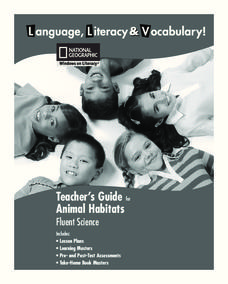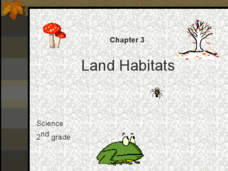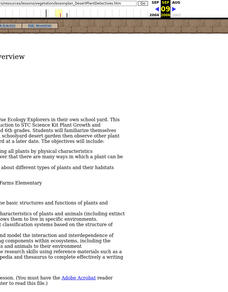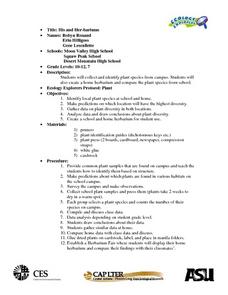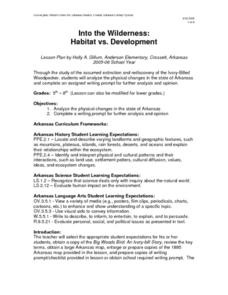National Geographic
Animal Habitats
Explore animal habitats and reinforce speaking, listening, reading comprehension, and writing skills with a unit that focuses on the Arctic, desert, ocean, prairie, and rainforest. Enthusiastic scientists read informational text to...
Lerner Publishing
Teaching Habitats
What makes up a habitat? Use this resource to engage first graders in the exploration of desert, wetland, forest, and ocean habitats. Youngsters classify plants and animals into the four distinct habitats through drawings and cutting and...
Curated OER
Land Habitats: Grade 3 Science
Build your students scientific vocabulary with this slide show on land habitats. Each slide provides a vocabulary word, image, and definition of a term common to habitats and the environment. Great for science class or as comprehensible...
Core Knowledge Foundation
Animals and Habitats Tell It Again!™ Read-Aloud Anthology
A read-aloud anthology explores various habitats and the animals that inhabit them, from the Artic to the desert, the forest, and bodies of water. First graders listen to and discuss texts and complete word work. Each lesson offers...
Curated OER
Introducing Habitats and Biodiversity
Pupils identify habitats in Arizona. Theys define and illustrate a food web, and explain the importance fo biodiversity.
Curated OER
Habitats - Explore the World Around You.
Explore the habitats found around the world. The Desert, Rain Forest, Tundra, Prairie, Grassland, Forest, Marine and Zoo habitats are all covered in this easy to follow presentation. Each slide has a themed background picture, several...
Curated OER
Habitats
Photographs of different habitats ask viewers to consider who would live in each. Desert, polar, rain forest, freshwater, and ocean habitats are depicted. Each is followed by a slide with pictures and color graphics of the inhabitants....
Curated OER
Habitats
In this habitats worksheet, 3rd graders cut out the 14 habitat descriptions and place them under the correct habitat...
Curated OER
Force of Habitat
Plants and animals of the desert are the subject of this lesson plan. While the activities involve an exploration involving Nevada, this resource could be altered for use with any area. This detailed lesson plan includes a list of books...
Scholastic
Study Jams! Biomes
Do you know the difference between a biome and an ecosystem? Teach elementary ecologists exactly what a biome is with this captivating cartoon! It discusses six biomes: taiga, tundra, deciduous forest, desert, tropical rainforest, and...
Curated OER
Desert Plant Detectives
Students examine and categorize plants in their own schoolyard desert garden and then observe other plant areas of their schoolyard.
National Wildlife Federation
What's Your Habitat?
How are third graders like rabbits? They both live in habitats and require food, water, and shelter to survive! An educational science activity encourages your learners to think about their own habitats and survival needs, before...
ARKive
Adaptations for Movement
What animals are best suited for moving around a rainforest, or a desert? Design your own animal species based on a particular habitat, focusing on the characteristics it will need for optimal movement. Great as a group lesson or...
Project WET Foundation
Investigate Fresh Water
It's all about freshwater in this water interactive! Users navigate through freshwater habitats such as lakes, rivers, and wetlands, taking note of the animals that live there. They also look at a desert habitat for comparison....
Curated OER
Science: Her-bariums Galore!
Students collect and identify plant species and construct herbariums both at school and at home. By gathering data from both locales, they draw conclusions and make predictions about plant diversity. Upon completion of the exercises,...
Curated OER
Into the Wilderness: Habitat vs. Development
By studying the once-assumed extinction, then rediscovery of the Ivory-Billed Woodpecker, learners look at the physical changes that have occured in habitats throughout Arkansas. This outstanding lesson is chock full of terrific...
Curated OER
Deserts: How Do You Define One?
Second graders identify what constitutes as a desert by reading a habitat checklist. For this environment lesson, 2nd graders read a nature website to discover facts about the desert and where they are located. Students...
Curated OER
Habitats
Second graders identify characteristics of various habitats. For this habitats lesson, 2nd graders read Where the Forest Meets the Sea and Swimmy to identify the settings of different habitats. Students construct murals of different...
Curated OER
Happy Habitats
Students explore different habitats. In this habitat lesson, students investigate four different habitats through participating in a WebQuest. Students create an animal web using Kidspiration or a video documentary upon completing the...
Curated OER
Animal Habitats
Learners research an animal and their habitat. In this animal habitat instructional activity, students observe a WebQuest that describes the different habitats: deserts, tundra, rainforest, forest, and ocean. They determine which habitat...
Curated OER
Habitats
Students examine how different living things interact with their environment. As a class, they discuss the characteristics of a habitat and write the list on the board. In groups, they focus on one habitat and create a mural of the...
Curated OER
Habitats: must live with them....cannot live without them.
Learners conduct an internet study regarding habitat, ecosystem, biome and the region they live in. They observe the habitat by visiting a State Park and observing the organisms in their habitat. In addition, they create their own...
Curated OER
Habitats: Oceans & Deserts
Students perform a variety of lessons to explore deserts and oceans.
Curated OER
Endangered Species in the Sonoran Desert
Students identify and explain some caused of endangerment and extinction for species as well as explain the effects of extinction on an ecosystem. Teachers use this lesson plan before teaching students about collecting insects or plants.


